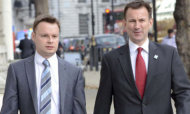Culture Secretary Jeremy Hunt's former special adviser has told the Leveson Inquiry he was told to resign after damaging emails revealing the close relationship between his department and the Murdoch empire were released.
Ex-aide Adam Smith said the Secretary of State had reassured him that he had only been doing his job and not to worry on the evening the documents were published.
But the following day Mr Hunt spent the morning in meetings before calling in Mr Smith and telling him "everyone here thinks you need to go", he told the inquiry.
Mr Smith, 30, resigned last month after admitting his contacts with News Corporation lobbyist Fred Michel had got too close.
Mr Smith told the inquiry into media ethics that Mr Michel"bombarded" him with information about the BSkyB bid, but said he ignored much of that correspondence.
The inquiry heard yesterday that Mr Michel exchanged 191 telephone calls, 158 emails and 799 texts with Mr Hunt's team between June 2010, when News Corpannounced its bid, and last July, when it abandoned the plan amid outrage over the News Of The World phone-hacking scandal.
Of these, more than 90% were exchanged with Mr Smith, who sent 257 texts to Mr Michel between November 2010 and last July.
Mr Smith insisted he had not been given any specific instructions by Mr Hunt or civil servants on his role in the decision on BSkyB, owner of Sky News.
Meanwhile, it has emerged that the embattled Culture Secretary will be grilled over his links with News Corp on Thursday.
Mr Hunt is under intense pressure following the publication by the inquiry yesterday of a memo in which he made private representations to the Prime Minister supporting News Corp's bid just weeks before he was given the role in the quasi-judicial decision.
But David Cameron has sprung to his defence, saying Mr Hunt acted "impartially" once he was made responsible for overseeing the BSkyB takeover bid.
"I don't regret giving the job to Jeremy Hunt, it was the right thing to do in the circumstances, which were not of my making," Mr Cameron told ITV's This Morning.
"The crucial point, the really crucial point, is did Jeremy Hunt carry out his role properly with respect to BSkyB and I believe that he did."
Mr Hunt was given the role after Business Secretary Vince Cable was stripped of the responsibility over comments made to undercover journalists.
The memo, dated November 19, 2010, warned that News Corp's James Murdoch was "furious" about Mr Cable 's handling of the matter.
It also expressed concerns that referring the bid to Ofcom could leave the Government "on the wrong side of media policy".
As well as Mr Hunt, other key witnesses to appear before Lord Justice Leveson next week include former prime minister Tony Blair, Education Secretary Michael Gove, Home Secretary Theresa May, Mr Cable and Justice Secretary Ken Clarke.
Jonathan Stephens, the top civil servant in Mr Hunt's department, is now giving evidence to the inquiry.
Mr Stephens, permanent secretary at the Department for Culture, Media and Sport, has admitted that the correspondence between Mr Smith and News Corp was a "calamity" for the department.
He added that although Mr Smith was "young, able and well-intentioned" he had been "drawn into a web of manipulation".
Mr Hunt is now facing renewed calls from Labour MPs to resign following the publication of yesterday's memo.
Labour deputy leader Harriet Harman told Sky News: "Mr Hunt said he would act impartially but he wasn't impartial because he had already made up his mind.
"Yesterday, it became clear the Prime Minister should have never given Mr Hunt the responsibility to make this decision because he himself knew that Mr Hunt was not impartial and he was already backing the bid.
"Even prior to the memo Mr Hunt had been warned by his civil servants that he had to stop meeting with the Murdochs because he was meddling with the bid."
But Downing Street has played down its significance, pointing out that Mr Hunt had already made supportive comments about the bid in press interviews earlier that year.

No comments:
Post a Comment